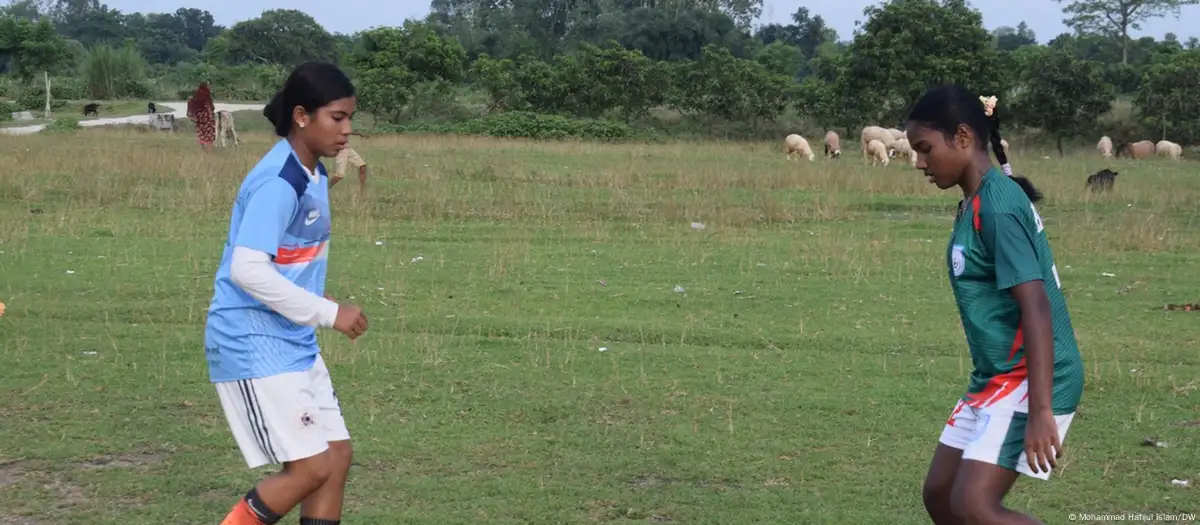The role of remote village academies in women's football in Bangladesh

Bangladesh is emerging with a new surprise in women's football. An academy built by one man in a remote village has helped many footballers overcome obstacles on and off the field. Last July, the Bangladesh women's national football team made history by qualifying for the Women's Asian Cup for the first time. After Rituparna Chakma-Maria Manda, the Bangladesh U-20 women's football team, made up of Mosammat Sagarika-Shanti Mardi, has achieved another major success this month. They have brought Bangladesh the title for the first time in this age-based edition of the SAFF Championship. One of the key players in this success is the Rangatungi United Women's Football Academy, located in the north of the country. It was founded in 2014 by Mohammad Tajul Islam. He is not a big businessman, but a former teacher and farmer. "Before I started the academy, there was almost nothing," he told DW, adding,"Before I started the academy, there was almost nothing," he said. "I love football very much. I felt that women's football in Bangladesh had the potential to become strong, and I wanted to give it that opportunity." That opportunity has made history today. The two Bangladesh women's teams that qualified for the Asian Cup each have three players from this academy. Tajul said, Many female players of all ages have gone on to play in big venues from her academy. "We are proud of our players," she says. Rising stars of women's football Mosammat Sagarika is one of the academy's most famous players. The 17-year-old scored four goals for the U-20 team in the Asian Cup qualifiers. The striker is one of the best young stars in South Asia. Sagarika told DW, "I always wanted to be a footballer. But my parents were not willing to accept it due to social and religious reasons." She added that her family wanted her to try to get a job quickly. For Tajul Islam, it was a challenge to convince low-income families that their daughters could play football too. Sagarika says, "After joining the academy, my parents said that I can play as long as my studies are not affected. At first, my father was not supportive, "Later he gradually started supporting me. I promised my parents that I would become a bigger player." Breaking the barrier of prohibition Parents gave permission, but society frowned upon it? Questions continue to arise about girls playing football, especially wearing shorts. Women's sports have traditionally not received much priority in Bangladesh. Last January, Islamic fundamentalists vandalized a women's football match in Joypurhat and disrupted the event. "Our society is conservative and we are a Muslim-majority country. There are some people who do not agree with women playing football," Tajul said. He believes it is important to have broad support for women's football. "We are asking local politicians, police and I went to the administrators and they also supported the academy. Joining the academy makes it easier for girls there to participate in sports. Sagarika also said in one voice, "The academy has given us protection in all these areas." There are still many obstacles In 2024, Sagarika's match against India was watched by the residents of her village by renting a projector. Although they initially did not like Sagarika's game. Sagarika's parents came to the stadium to watch the game. Sagarika said, "During the break in the game, someone came and told me that my parents had arrived. I ran to them. I was very happy that they had come from such a distance to see me. "Sagarika scored a goal in the last minute of this match. "I showed my parents that I could do it," said Sagarika. "I am very happy that they came to see me." However, despite their success, they still have to continue fighting. They need massive financial support to run the academy. Tajul said that he has spent all his wealth on it. He has also received help from some people. But he needs more help to cover the expenses. Tajul lamented, "The whole of Bangladesh knows about Rangatungi, but no help has come from the national level yet." However, the good news is that female footballers have already started earning through playing. There are more than fifty female footballers contracted with the Bangladesh Football Federation (BFF). Their monthly salaries range from 15,000 taka to 55,000 taka. Players are also starting to get opportunities in foreign clubs. At least ten people play club football in Bhutan. They dream of participating in the 2027 World Cup in Brazil, even if it is difficult. If not, they want to create an opportunity to play in the World Cup within the next decade. In Sagarika's words, "Our enthusiasm and perseverance will achieve our goals, we are constantly trying to do that." John Duarden/ST DW

